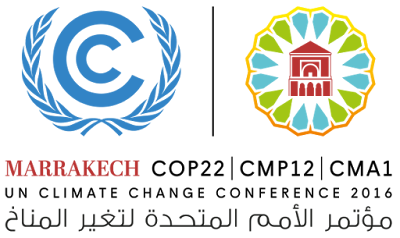 |
| Civil Society Event for Outgoing U.N. Secretary General Ban Ki Moon (Photo by Gillian Bowser) |
As I was leaving the Moroccan venue on the last day of the United
Nations climate conference (COP22), participants were gathering for a photo
with a banner avowing “We will move ahead!” The message was similar to one on a
banner used at a civil society ceremony for outgoing U.N. Secretary General Ban
Ki Moon: “Climate action is unstoppable.” Given the mood at the conference
after the outcome of the U.S. elections, I couldn’t help but wonder if these
declarations were aimed at our country and president-elect Trump.
With the media fully focused on the campaign and post-election
analysis, there was little coverage of COP22 back in this country. But in
Marrakech, there was a palpable sense of urgency to hammer out the
implementation details of the Paris Agreement which entered into force on
November 4th. Although 112 of 197 countries, including the U.S.,
have already ratified the agreement, the current pledged national reductions in
greenhouse gas emissions are inadequate to achieve the goal of holding global
temperature increase to no more than 2°C. For the first four months of 2016, the average global surface temperature
was hovering around 1.2°C
warmer than the 1951 to 1980 mean, and 2016 is on track to be the warmest year
on record. The previous warmest year, 2015, was 0.8°C warmer than the long temp average.
While in Marrakech, I attended an event entitled “Earth Info.” Some
of the latest climate science was presented about the extent of extreme weather
events, sea ice loss, and ocean indicators of change. I wasn’t surprised by the
data or the faster-than-expected pace of change. I was, however, shocked by the
comments of a presenter from FuturEarth.org who argued that in order to meet
the temperature goals of the Paris Agreement, the world will have to reach peak
emissions within four years, be at net-zero emissions within forty years, and develop
a new carbon sink on the scale of the planet’s oceans within eighty years. In
other words, our global decarbonization challenge will require not only
tremendous advances in clean energy technology but also geo-engineered
solutions. For those who believe that technology has created a number of
environmental and social disasters throughout history, this was terrifying news.
For those who believe that technological solutions are what will get us out of
the climate change mess and spur a new low-carbon, clean energy economy, the uncertain
future role of the U.S. in leading the new research and tech development is unsettling.
It didn’t take long after the election for China’s Vice Foreign
Minister Liu Zhenmin to remind the world of the important role that the U.S.
had played in the history of climate change negotiations under Republican
leadership in the late 1980s (as opposed to global warming being “created by
and for the Chinese”). China, however, sees this new political environment as
an opportunity to take the lead in global climate change action. Over the past
five years, they have become the top investor in renewable energy, outspending
the EU by a factor of 2.5 in 2015.
John Kerry, in his last speech to a COP audience as Secretary of
State, noted that emerging economies like China, India and Brazil invested more
in renewable technologies last year than the developed world. He went on to say
that “clean energy is expected to be a multitrillion dollar market – the
largest market the world has ever known,” and added “…no nation will do well if
it sits on the sidelines, handicapping its new businesses from reaping the
benefits of the clean-tech explosion.”[1]
Despite its shortcomings, the Paris Agreement sent a strong message
to the private sector. Consistent with this, a letter signed by several hundred
members of the U.S. business and investment community was addressed to President-elect
Trump, urging him to keep our nation engaged in the Paris process and support
the goals of the Agreement.[2]
The results of the U.S. elections cast a long shadow over the
international negotiations. I reflected on how different things felt from the
last time there was a change in the U.S. leadership – my first COP – in 2009. At
that time, Obama was new in office and there was optimism that we would provide
the much needed leadership on tackling climate change. Since then, the rest of
the world has become much more unified on a way forward on this global
challenge, and developing countries are now assuming the leadership in finding
solutions to both a low carbon future and adapting to the impacts of climate
change. It remains to be seen whether our country will stand alone on the
outside of this unified movement, or if the momentum is strong enough among
local governments, businesses, colleges and universities, and civil society to
convince our new leaders to stay the course.







